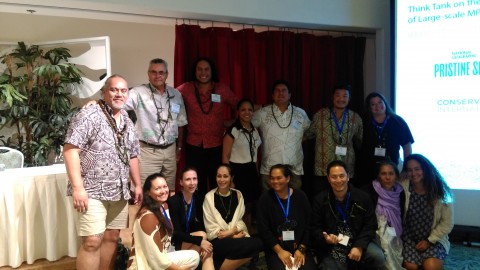My cultural and conservation mission to Hawaii
By Claudia Naraina
This February I was invited to attend the Big Ocean Think Tank on the integration of human dimensions in large-scale marine reserve management. Over 100 people from 15 different countries came to represent their respective countries and their marine reserves, large or small.
The aim of the meeting was to explore the social, cultural, political, institutional, and economic considerations and needs of the human dimension in these important marine areas. I was proudly representing the Chagos Archipelago, thanks to the Chagos Conservation Trust and the Great Barrier Reef Marine Park Authority, and was amazed at how many people knew about Chagos and the Chagossian's history. They were very pleased to finally meet one of us. Yes! we do exist, even though we no longer live on our islands, we love, care and value both our natural and cultural heritage.

For three days we talked, shared ideas and worked together as managers from different parts of the globe on design, management and about our commitment and responsibility towards our respective marine reserves.
I really liked the methods used by the organisers, people were able to speak freely and our diverse opinions were respected and listened to. We were divided into groups to talk about different concerns, issues, challenges, engagement, common visions and targets
On the first day I was part of the Indigenous/community involvement group and even though Chagos is uninhabited, many of the issues are relevant to other small islands everywhere. We talked about natural and cultural amalgamation, how to help people interact with ecological factors, social and economic aspects, food security and the importance of education, looking behind before we could go ahead, looking at the past to ensure a better future for our children.
We also shared ideas on how to successfully implement human dimensions and ongoing management in large-scale marine reserves. People talked about being managers themselves one day and I proudly used Dr Heather Koldewey's Project Seahorse in the Philippines as an example of human dimensions integration and the Connect Chagos programme, which used a very good technique that helped strengthen stakeholder trust, raised environmental awareness and enhanced knowledge of natural resources.
During the last two days we continued to share ideas with enthusiasm and worked together to develop new strategies and methods on how to successfully integrate coastal management if managed in isolation. We talked about poaching, destruction of habitats, water pollution and how to protect coastal marine areas, species, and landscapes and where to go from here. A number of new research projects were suggested using the ideas shared on how and what we can do better and how we can work together as a community to improve the way we are managing our marine areas.
Imagine a world surrounded with unclean water, think about climate change and the impacts on the ocean and on the environment. The ocean belongs to us all. It is vital that we work together to ensure a better future for this planet.
I have learnt a lot about other people's cultures and traditions, I was amazed by the unity and humility of people of the Pacific Islands, and also had time to reflect on my own. It was truly an honour to be part of a special Hawaiian ceremony at the end.
Thanks to the organisers, to all the sponsors and other people who contributed to make this workshop a success.
Claudia Naraina is a healthcare professional from Manchester. She is passionate about conservation, loves scuba diving and other water sports. She graduated from the Connect Chagos Programme in 2015 and continues to developed skills in conservation. She has been on an expedition to learn about the Chagos Archipelago and the fauna and flora it supports and hopes to draw upon the knowledge gained to educate the Chagossian Community and the public at large.

